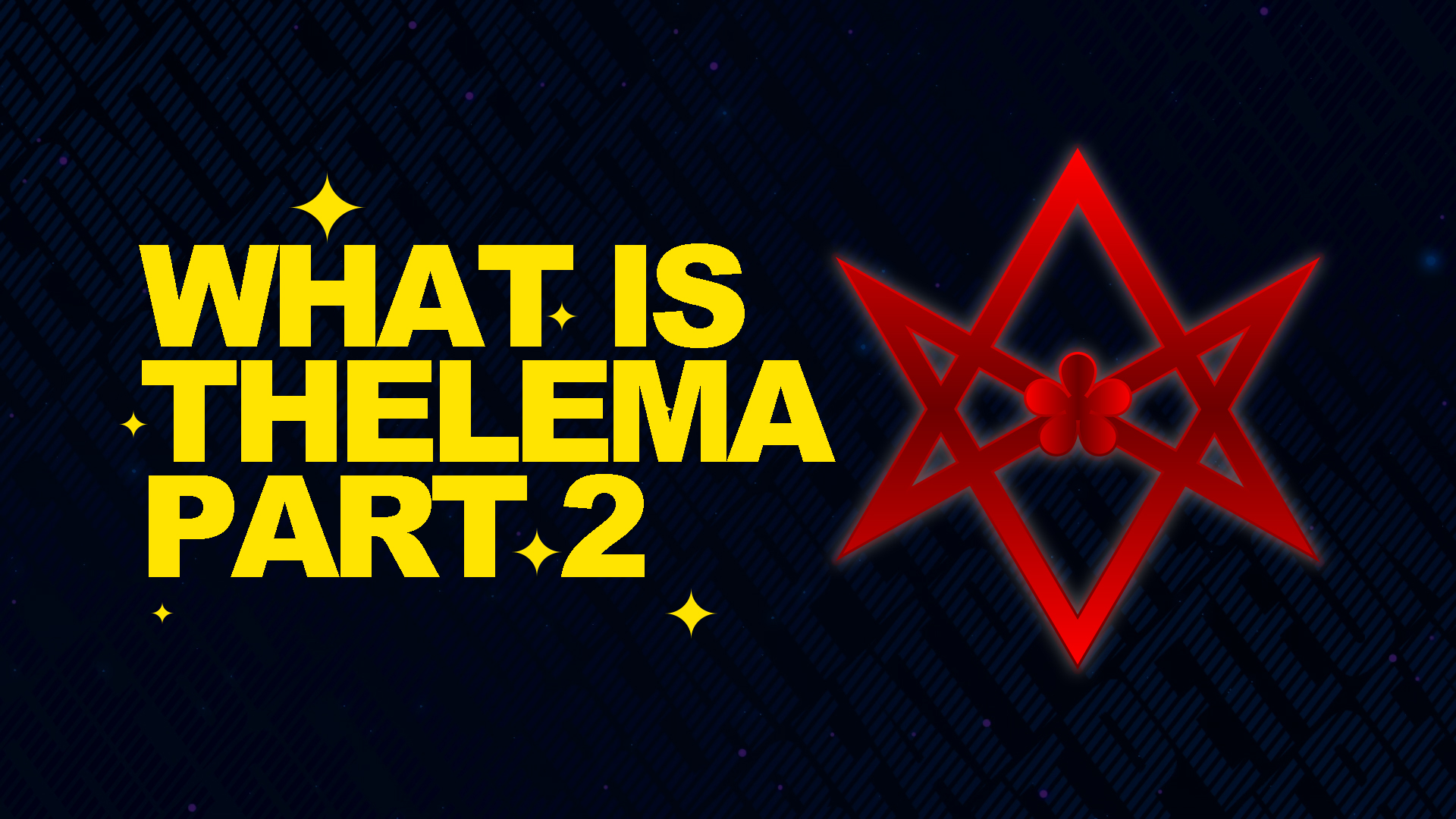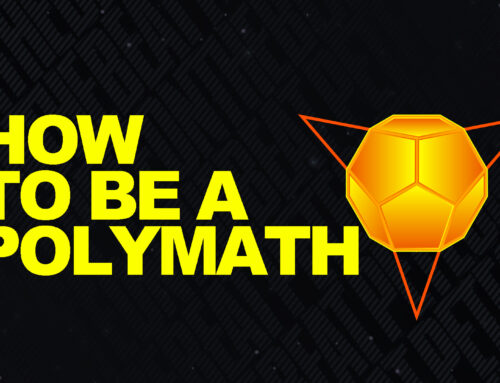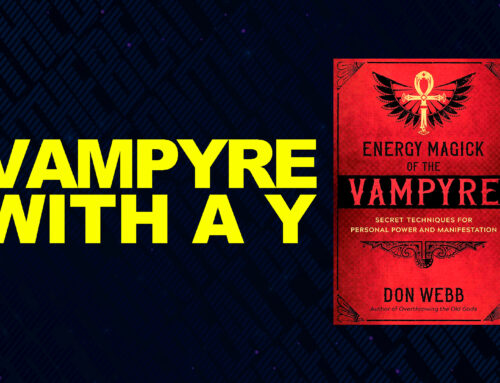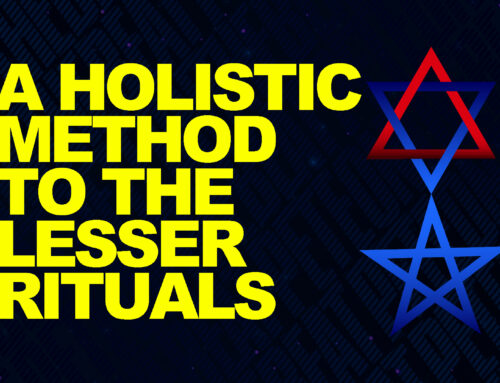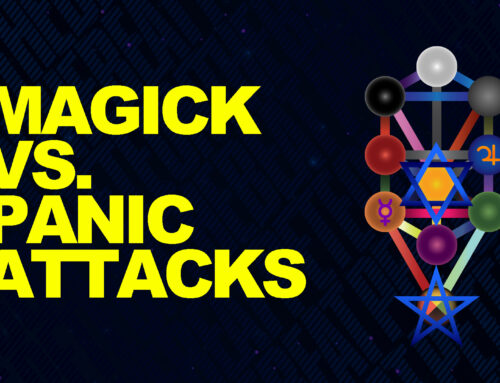“Man has the right to live by his own law–
to live in the way that he wills to do:
To work as he will:
to play as he will:
to rest as he will:
to die when and how he will.
Man has the right to eat what he will:
To drink what he will:
to dwell where he will:
to move as he will on the face of the earth.
Man has the right to think what he will:
To speak what he will:
to write what he will:
to draw, paint, carve, etch, mold, and build as he will:
to dress as he will.
Man has the right to love as he will:
“take your fill and Will of love as ye will,
when, where, and with whom ye will.”
Introduction
Found in The Book of the Law Chapter 3, ‘Do What Thou Wilt’ outlines Thelema’s framework for living. While that’s more general, Crowley provides two works clarifying its meaning and preventing misconceptions.
Liber Oz
Getting more particular, the first is ‘Liber Oz.’ It applies the included segment equally to (both) women and men. Regarded as a one-page summary of Crowley’s ideas, ‘Liber Oz’ brings insights into the Thelemites’ way of living. One of Crowley’s last and shortest works, ‘Liber Oz,’ has five sections: moral, bodily, mental, sexual, and safeguard tyrannicide. It was written because of complaints about Crowley’s works being too challenging to grasp. Minding that, Crowley used mainly one-word syllables to create it. And, speaking of that, ‘Do What Thou Wilt’ is all one-word syllables.
Comment 1
According to many sources, ‘Liber Oz’ was written for Crowley’s friend, the author, and biographer Louis Wilkinson, aka Louis Marlow. According to Robert Anton Wilson, Liber Oz might have been one of the works attracting Jack Parsons to Thelema alongside ‘Book 4.’
Ethical Code. Duty
Duty is the second work elaborating on ‘Do What Thou Wilt.’ It has four sections, each dealing with an aspect of your being.
The first is called ‘Your Duty to Yourself.’ It emphasizes the individual as the Universe’s center, urging self-discovery, personal development, and devotion to one’s True Will, explained in part 1.
The second, ‘Duty To Other Individual Men And Women,’ encourages eliminating the illusion of separateness. It advocates ‘combat’ and ‘enlightening’ based on circumstances. Also, refraining from interfering with others’ Will. Reminding that ‘Every man and every woman is a star, this section advocates treating men and women with absolute respect.
Comment 2 This reminds me of Immanuel Kant saying rational human beings should be treated as an end in themselves, not as a means to something else.
“Each being is, exactly as you are, the sole center of a Universe in no wise identical with or even assimilable to your own…”
Your Duty to Mankind asserts the Law of Thelema as a societal conduct’s basis. That is through legal systems maximizing individual liberty. It also defines crime as a violation of one’s True Will.
“The essence of crime is that it restricts the freedom of the individual outraged. (Thus, murder restricts his right to live; robbery, his right to enjoy the fruits of his labor; coining, his right to the guarantee of the State that he shall barter in security; etc.)”
In Magick in Theory and Practice, Crowley explains criminals are at issue with their True Wills. They have the will to live, but their will to commit crimes is a false impulse, contradicting the ‘True Will’ and risking their life.
“The essence of crime is that it restricts the freedom of the individual outraged. (Thus, murder restricts his right to live; robbery, his right to enjoy the fruits of his labor; coining, his right to the guarantee of the State that he shall barter in security; etc.)”
Duty’s portion four is to all other beings and things. It prohibits the misuse of any living beings and/or objects. It also emphasizes utilizing natural resources responsibly to avoid retribution under the law.
“It is a violation of the Law of Thelema to abuse the natural qualities of any animal or object by diverting it from its proper function. To work in conscious harmony with Evolution…”
Taking Control
Thelema puts you in the driver’s seat, giving you control of your destiny. As Marco Visconti says, you are the story’s main protagonist. You are in control, neither gods nor priests nor anyone or anything else. The individual, symbolized by Horus: the crowned and conquering child striving for sovereignty, as addressed in part 1.
The Way of the Strong
A work expressing those explicitly is David Cherubim’s ‘Thelema: The Way of the Strong!‘ Being a musician and Thelemic Golden Dawn co-founder, Cherubim expounds on the Thelema’s notion of ‘masters’ and ‘slaves.’ Unlike what some may assume, this isn’t the first dominating and/or abusing the second. And neither the second worshipping and serving the first. Quite the opposite.
Masters
No person is free who is not master of himself…
— Epictetus
Being initiates of the Great Work, masters strive for freedom from slavery and restriction. They are self-governed and self-sufficient. Following their True Will, masters unite with the All by doing just that. They think and act independently, expanding consciousness by incorporating their True Self in all aspects of their life.
Extreme Ownership
Masters take complete responsibility for their situation, i.e., extreme ownership. Although cooperating with others — collaborating with other stars in Nuit’s body, masters control their reality and sphere of being.
Comment 3
Consider your circle of people, habits, and nutritional and informational diets. And let me know if that applies to you.
Stoicism
Nothing is against those Thelema calls masters. Mistakes and failures become stepping stones when using the inertia of the Universe. Like stoics viewing obstacles as growth opportunities exercising one of the stoic virtues: temperance, wisdom, courage, and justice, masters strive for excellence in all they do. Such a mindset allows masters to maximally avail of Nuit’s possibilities, exercising love under will explained in part 1. They are stars shining brightly… whereas slaves stay in the darkness, inadequate and unaware of their True Will.
Kings
Thelema also calls masters ‘kings.’ As the proverb says, kings build castles with the stones thrown at them. On the contrary, reminding ourselves this is a metaphor is necessary, and the same applies to women, as evident in ‘Liber Oz…’ And the Gnostic Mass, where the priest and the priestess have equal importance.
Slaves
Thelema calls ‘slaves’ those permanently and pre-programmed/determined by the external. They are victims of whatever is there. They stay in the darkness of ignorance and mass consciousness’s confusion. They are not self-reliant, as their satisfaction depends on others. They have no self-control but want to control each other, usually blaming others for their misfortune.
Starting at the Bottom
Thelema calls ‘slaves’ those in conflict with the deeper aspects of reality and their souls. Luckily, things are reversible. And every master is a former slave. As Cherubim explains, and self-help confirms, everyone must start at the bottom, working to the Great Mountain of Success. And there’s no ‘greater success,’ joy, and fulfillment than living one’s True Will. Consider the discussed-in-part 1 Ikigai and let me know your thoughts.
Comment 4
One may find many commonalities between Thelema’s ‘masters and slaves’ and N. Hill’s concept of ‘go-getters’ and ‘drifters.’ Acting independently, ‘go-getters’ do their own thinking. They are self-reliant and autonomous, shining and providing value to the collective. They use hypnotic rhythm to their own advantage. Drifters are permanently pre-programmed by the external and victims of hypnotic rhythm. Think of the inertia of the Universe, and let me know if you agree.
Comment 5
Though unrecognized in Thelemic books, I believe the rise of the ‘creator economy’ embodies the mentioned and the Aeon of Horus. In former eras, that was impossible. Thanks to the internet, such a model become the norm (rapidly). It’s a way to live your True Will by leveraging the internet and achieving self-sufficiency. Plus, striving for excellence with each piece and product connects oneself with the deepest parts of reality. And while Thelemic scholars explain we are at New Aeon’s threshold, Naval Ravikant tweets:
“There are almost 7B people on this planet. Someday, I hope, there will be almost 7B companies…”
IMHO, this is the new Aeon’s natural unfoldment. Let me know if you agree, such as your thoughts on this channel discussing meaning and mystery not only in the occult.
Conquering
In the Book of the Law, Chapter 3, Hadit states:
“I am unique and conqueror. I am not of the slaves that perish. Be they damned & dead! Amen! (…)
The first part of this shows how Western Esoteric Thelema is. As Dion Fortune’s Mystical Qabalah emphasizes, the healthy Westerner doesn’t want a retreat from reality but to conquer it. Only the pathological (or sick) cases wish to escape that.
As for the second, it shows Crowley being a walking contradiction, as he had a substantial financial background in the form of inheritance. Let me know if you agree.
Thelemites
Simple as it sounds, Thelemites follow their ‘True Will.’ Whether you define yourself as one is irrelevant. Whether someone else will approve that, even less.
Thelemites greet themselves using 93. As found in the Book of the Law, that’s the same numerical value as Agape, which means Love.
Magick and Yoga
“β: To train the mind to move with the maximum speed and energy, with the utmost possible accuracy in the chosen direction, and with the minimum of disturbance or friction. That is Magick.
α: To stop the mind altogether. That is Yoga…”
Magick Without Tears. Chapter XVI.
Thelemites use magick and yoga for personal development. Stripping internal and external conditioning, the two improve fittedness to pursue the True Will. This enables them to understand themselves and the Universe better. As Robert Anton Wilson says (paraphrasing), changing your mind changes the universe, as there’s no other universe apart from yours.
Accidental Thelema
Magick and Yoga actualize one’s potential. Yet, they are not required. Often, people are Thelemites without even knowing. The same applies to magicians, which I think is true with some of our time’s ‘greatest.’ As Crowley says in Book 4:
“Magick is the Science of understanding oneself and one’s conditions. It is the Art of applying that understanding in action…”
Reconciling Opposites
Thelemites aim to transcend their mundane consciousness. They use magick and yoga to reconcile the opposites within themselves and identify with none but the essence, which is uniquely expressed in the individual but transcends life, death, and dualities. An example of that can be found in one of Thelema’s Holy Books, Liber Tzaddi:
“My adepts stand upright; their head above the heavens, their feet below the hells. But since one is naturally attracted to the Angel, another to the Demon, let the first strengthen the lower link, the last attach more firmly to the higher. Thus shall equilibrium become perfect. I will aid my disciples; as fast as they acquire this balanced power and joy, so faster will I push them…”
Beliefs
“The Gods are but names for the forces of Nature themselves…”
Although it has an intricate cosmogony, Thelema doesn’t have strict rules regarding beliefs. Some Thelemites are polytheists; others aren’t. Some view spirits and deities as separate (external) entities, others — as primal archetypes (aspects) of oneself and the collective following the ‘psychological model.’ A third group doesn’t think they are mutually exclusive.
An example is Lon Milo Duquette’s saying: ‘Magick is all in your head. You just don’t know how big your head is…’ As I like to say: “Magick is not only in your head, but it usually starts there.” Let me know how it goes for you.
Results over Labels
In his Aleister Crowley Manual, Marco Visconti explains that whether spirits and deities are purely internal or external is irrelevant. Important are only the results a ritual produces.
“It’s immaterial whether these deities exist or not. From our perspective, that of the magician, we know that if we use rituals that involve them, results will follow…”
p. 158. The Aleister Crowley Manual
Scientific Illuminism
Skepticism plays a massive role in Thelema. While other methods require believing in something, Thelema doesn’t. It teaches you to (first) do the work and draw conclusions. Though subjective, the last will be valuable. In that sense, Thelema abolishes superstition and dogma. Or at least it does on paper.
Religion
The word ‘religion’ comes from the Latin noun ‘religio.’ According to the different sources, its meanings include moral obligation, duty, and feelings of ‘awe’ and ‘anxiety.’ Also, bond and reverence. In Маgick Without Tears, Crowley states:
“(…) our system is a religion just so far as a religion means an enthusiastic putting-together of a series of doctrines, no one of which must in any way clash with Science or Magick…”
“Call it a new religion, then, if it so please, your Gracious Majesty, but I confess that I fail to see what you will have gained by so doing, and I feel bound to add that you might easily cause a great deal of misunderstanding, and work a rather stupid kind of mischief…”
Holy Books
Thelema’s Holy books aren’t to be taken as ‘dogmas’ or sources of information. Instead, they teach how to extract your own meaning, which can vary depending on the individual. It is religion as far as it aims to bond/connect your soul’s most profound aspects with the same ones of reality, i.e., love under will, as discussed in part one. Yet, that is achieved through first-hand experiences and real life. As Crowley says:
“The method of science in the aim of religion.”
This means you should be your own magician, biohacker, and self-improver, get empirical results, and choose what to believe in and outside of Magick. It also implies embracing continuous growth and change, as the Fortune Card depicts.
Thelema advocates becoming enlightened and seeking esoteric meanings by embracing the tools and technology available. Given that, it’s great to be guided by two quotes. One is from the Zen master and Haiku poet Matsau Basho, and another is from the biohacker modern alchemist Joe Dispenza.
“Seek not the paths of the ancients;
Seek that which the ancients sought.”
— Matsuo Basho
“Science is the contemporary language of mystery…”
— Dr. Joe Dispenza
The Science and Art of Mystery
A book explaining that thoroughly is David Shoemaker’s Living Thelema. In chapter 22, the author offers that integrating contemporary scientific discoveries will unveil new horizons for human development. Like the previous two, Shoemaker advises seeking the mystery and extracting meaning from such discoveries. He also advocates approaching that with childlike creative imagination, similar to how medieval alchemists got inspired by chemistry.
Philosophy
While some regard Thelema as religion, others call it a philosophy. Essentially, ‘Do What Thou Wilt’ is an ethical code. Hence, Thelema is a way of living similar to Stoicism. From that perspective, it is a philosophy. Regarding academic philosophy, in Magick in Theory and Practice, Crowley calls that as the enemy of Magick, Science, and life. Therefore, assuming Thelema has nothing to do with academic philosophy is safe.
“(…) many people confuse Philosophy with Magick…” Philosophy is the enemy of Magick. Philosophy assures us that, after all, nothing matters and that che sarà sarà…”
As mentioned earlier, Thelema is the opposite of that. It teaches you can change things by taking ownership and being proactive. Remember that every master was once a slave. And as scholars say Thelema advocates to be ‘an active participant.’
Influences
Like the Hermetic Order of the Golden Dawn, Thelema enormously informs Occulture. Evidence includes systems like Wicca, Modern Paganism, Chaos Magick, Satanism, and Setianism, which deserve separate posts. Considering the ongoing occult revival, the interest in it only grows. While that’s broadly discussed, I believe by influencing the New Age, Thelema has a tremendous impact on Self-Help. The concepts of the true self, life purpose, achieving self-sufficiency, and autonomy permeate every book in the genre.
I also believe books by former Navy seals claiming discipline equals freedom and extreme ownership being the way to success, such as those of modern stoics like Ryan Holiday, suggest we live in the Aeon of Horus, especially since Horus associates with ‘fire and force.’ But that’s just my opinion. Let me know what is yours such as your thoughts on this article and video.
- An Autobiography of Trauma Book Review - April 23, 2024
- Reflections on Being a Polymath - April 12, 2024
- Greater Hexagram Ritual Manual Overview - March 31, 2024
